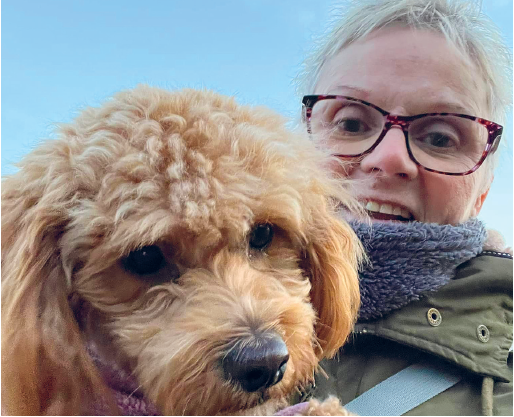Real stories
Counselling helped me come to terms with my young-onset dementia diagnosis
Sue Noakes has young-onset Alzheimer's disease and shares how counselling and continuing with mindful hobbies helped following her diagnosis.
Content warning: Sue's story talks about suicidal thoughts. If you need support, you can call Samaritans for free on 116 123.
I was working as a counsellor for Alzheimer’s Society when I started forgetting clients' names. I could remember all the other details – just not their names. And tasks I would usually find easy became a struggle.
I cared for both of my parents who had dementia, so I knew what signs to look out for.
My brother had recently been diagnosed with Alzheimer’s disease, and I just thought, “I know what this is".

Sue Noakes (left) and her parents on their wedding day (right)
Life-changing dementia diagnosis
We visited the GP, and I was referred to a memory clinic for tests. Initially, the doctors thought it was too early for a diagnosis, and I was told it was not conclusive.
But I knew the symptoms, so I paid for a private scan, which confirmed Alzheimer’s disease.
I got my diagnosis in September 2023, and the emotional impact was honestly stomach-churning.
The letter I got described my diagnosis in less than 10 words, telling me that I had young-onset dementia. Though there was nothing to explain what this life-changing news actually meant for me in practice.
I was close to suicidal. I didn’t want it for my family or for me, and I was in a dark place for quite a while.
Counselling helped me to accept my dementia diagnosis
After my diagnosis, my GP referred me for counselling. As this was my profession, I knew what it could do to help.
I ranted and raved – I have had quite a difficult life, and I was angry that this had happened now.
But the counselling helped, and I have become more accepting.
Young-onset dementia is a different beast to other types of dementia.
I don’t know my path in this, and at first, I didn’t want to see my future by spending time with other people affected by the condition.
But speaking to my colleagues from Alzheimer's Society helped me feel more comfortable spending time with other people with young-onset dementia and facing the future.
Mindful hobbies and staying social help me
I may have young-onset dementia, but that doesn't stop me from enjoying multiple different hobbies.
I enjoy playing my guitar at church for the Women’s Ministry Team (which puts on events for women) and I attend the One Voice Choir every other Monday – you don’t have to prove you can sing, you just join in!
I also attend a craft group, and I’ve taken up crochet. I've had lots of requests for blankets!
I love it because it gives me something to focus on, some time away from the diagnosis.
Being able to settle by playing the guitar, singing or crocheting makes my thoughts more settled.
Living the best I can with young-onset dementia
I am hoping to get back to beading so I can make jewellery, which is something I used to do, along with dressmaking.
I also love jigsaws, but now I find I can only do 500-piece puzzles, not the larger ones.
At Christmas, I tried to make a Lego model with my grandson, but I couldn’t do it. You don’t know until you try that your abilities are changing.
I can’t do anything about the diagnosis, I can only live with it as best I can.
I now know I have to get on with it and, if I’m feeling tired, I sit and crochet.
Thankfully, because of my job, I knew how to find out more about my diagnosis and get support.
But other people could be lost, and that’s why support from Alzheimer’s Society is so vital.
Donate to help us provide vital dementia support
Your donation will help fund vital support today, and the life-changing research that can transform tomorrow.


